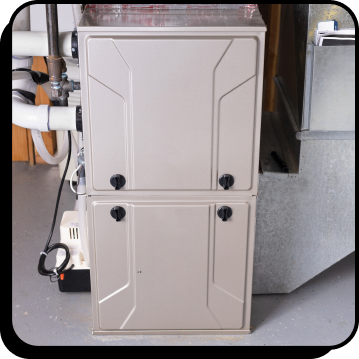The furnace is an essential piece of every home, which is why choosing the right one becomes such an imperative choice. With several models on the market, the system itself will always perform the same base function, boiling down the main differentiating factor between furnaces to the fuel source the system uses — natural gas, or electric. Whether searching for an upgrade to an existing unit, deciding if the current unit in your home is the most effective, or just trying to figure out the differences between the two types of fuels, it’s difficult to say definitively that one fuel is better than the other. Deciding which one is right for your home, in particular, will come down to weighing a multitude of factors, so as you take stock of the heating system within your home, keep these pros and cons in mind between gas and electric furnaces.
Gas Furnaces
Gas furnaces rely on a natural gas pipeline to supply the fuel for creating heat, wherein the system utilizes several burners to heat the air distributed by the heat exchanger throughout a home. In doing so, the gas furnace can achieve higher temperatures than its electric counterpart, and can generally heat a home faster, making it the superior option in areas that experience colder temperatures. Running off of natural gas makes it a relatively cheaper option over time when considering utility cost, as natural gas has been continuously skewing cheaper versus the cost of electricity over the last several years.
That said, a gas furnace can be more difficult to install, particularly if the home does not already have the available gas piping infrastructure to hook up a furnace. Additionally, the gas furnace has a more complicated and costly installation process and requires more regular maintenance to ensure that the unit continues to be properly sealed. This is because, while running the furnace, the unit has the potential to release carbon monoxide from burning off natural gas. As such, it is also imperative that a home has a working carbon monoxide filter safely installed and inspected regularly.
Electric Furnaces
Rather than utilizing a pilot light and burners, an electric furnace creates heat through the use of a coil system housed inside an air handler cabinet and dispersed using a blower fan. Because the unit uses electricity to heat the coils, the installation process and maintenance of an electric furnace is much less complicated and time-consuming than a gas furnace, and is safer overall, eliminating the risk of carbon monoxide exposure. An electric furnace also benefits from having a longer lifespan than a gas furnace — on average, about 30 years versus the gas furnace’s 20-year span.
While less complicated, an electric furnace can end up being the more expensive system over time, as the cost to run the system off of electricity will end up being more expensive than utilizing natural gas. Because of the difference in the heating source, the electric furnace is also the least heat efficient of the two, making it a better option for those in drier, warmer climates with less harsh winters.
Overall, the choice comes down to availability, feasibility, and climate. If natural gas is available at a reasonable rate, it’s feasible to install it in your home without incurring the major cost of running gas piping, and the climate is colder, the gas furnace is likely the better option. However, if the availability of electricity vs natural gas has a more balanced rate, the feasibility of installing a gas unit is prohibitive — due either to cost or logistics — and the climate doesn’t require running the heat at a higher sustained rate, then the electric furnace will win out in your home. Whichever unit is currently winning out on your personal pros and cons list, it’s always better to consult with a professional before pulling the trigger on an installation. If you have any questions about choosing a gas or electric furnace for your specific home heating needs, consider contacting the licensed experts at Duane Blanton Plumbing, Sewer, Heating & Cooling. Available and knowledgeable, the technicians are ready and able to help guide you on your home heating journey. Give them a call at (815) 219-4323, or reach out online via their online scheduling portal with any questions, or concerns, or for furnace installation and maintenance needs.
